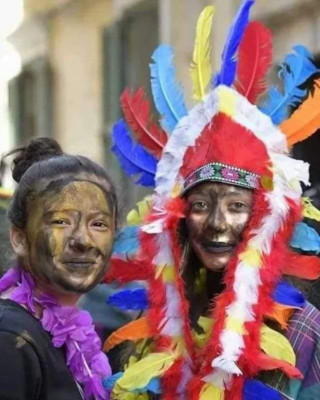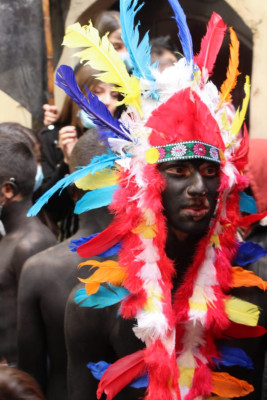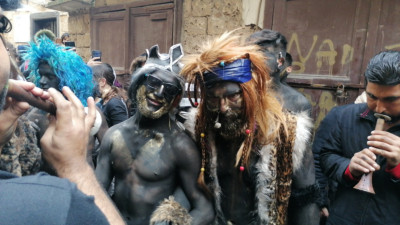Zambo Carnival
 The inhabitants of the old town of Al Mina in Tripoli celebrate the Zambo Carnival on the last Sunday before the Orthodox Christian period of Lent. This carnival has been celebrated for over 100 years, and this tradition is passed down from generation to generation. Its origins are highly controversial. According to some, this carnival is a tradition imported from Brazil by immigrants over a century ago. For others, it originated with the Greeks who once inhabited the city and held their carnival just before Lent. Additionally, some believe that Senegalese soldiers, who were present in Lebanon during the French Mandate, dressed up in African costumes to celebrate Mardi Gras thus inspiring the choice the carnival’s theme.
The inhabitants of the old town of Al Mina in Tripoli celebrate the Zambo Carnival on the last Sunday before the Orthodox Christian period of Lent. This carnival has been celebrated for over 100 years, and this tradition is passed down from generation to generation. Its origins are highly controversial. According to some, this carnival is a tradition imported from Brazil by immigrants over a century ago. For others, it originated with the Greeks who once inhabited the city and held their carnival just before Lent. Additionally, some believe that Senegalese soldiers, who were present in Lebanon during the French Mandate, dressed up in African costumes to celebrate Mardi Gras thus inspiring the choice the carnival’s theme.
 Regardless of its origins, the town’s inhabitants continue to perpetuate this tradition, drawing a large audience. Volunteers of all ages, from children to adults, actively participate in the colorful event. Throughout the carnival, individuals of different communities joyfully roam the town’s streets, singing and dancing. Participants paint their bodies and faces in vibrant colors such as black, red, silver, and gold, and flaunt bold patterns that reflect the dynamism of the carnival. They wear masks, colorful wigs, Amerindian feathers, etc.
Regardless of its origins, the town’s inhabitants continue to perpetuate this tradition, drawing a large audience. Volunteers of all ages, from children to adults, actively participate in the colorful event. Throughout the carnival, individuals of different communities joyfully roam the town’s streets, singing and dancing. Participants paint their bodies and faces in vibrant colors such as black, red, silver, and gold, and flaunt bold patterns that reflect the dynamism of the carnival. They wear masks, colorful wigs, Amerindian feathers, etc.
 The costumes are similar in appearance to those of the Rio de Janeiro festival in Brazil, but with the flair and substance of Mina, where drumming has a particular impact on young Zambian men and women. The costumes are also reminiscent of those of Halloween in American films.
The costumes are similar in appearance to those of the Rio de Janeiro festival in Brazil, but with the flair and substance of Mina, where drumming has a particular impact on young Zambian men and women. The costumes are also reminiscent of those of Halloween in American films.
The parade unfolds to the rhythm of the drums and the shouts of the participants. An atmosphere of great joy builds up as costumed people make their way through the alleys, singing and dancing, before heading for the sea. There, the bravest among them jump into the Mediterranean Sea, where the festival comes to an end. This unique cultural event in Lebanon not only brings Christians and Muslims together but also provides an excellent outlet for releasing pent-up energy and celebrating.

